Are you wondering if you should purchase a fan or air conditioner?
Many people worldwide struggle with this question, often making the incorrect choice. Some prefer simple air circulation while others want extreme cooling.
In this guide, we take a detailed look at the pros and cons of both and describe what the benefits are.
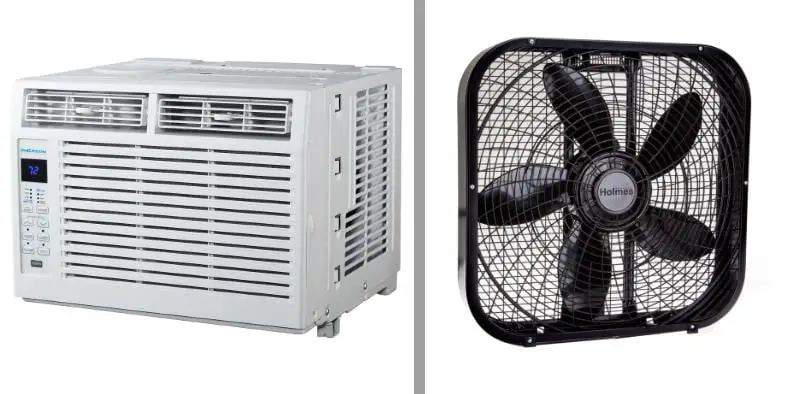
Fan vs Air Conditioner
We know not everyone has the time to read through a detailed article. Here’s the rundown on fans vs. air conditioners.

Fan
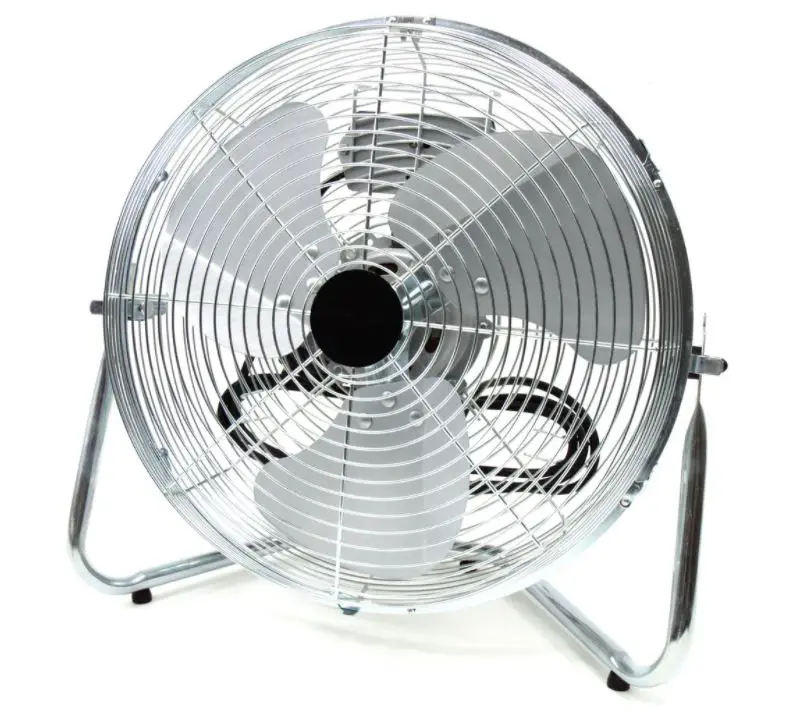
Air Conditioner
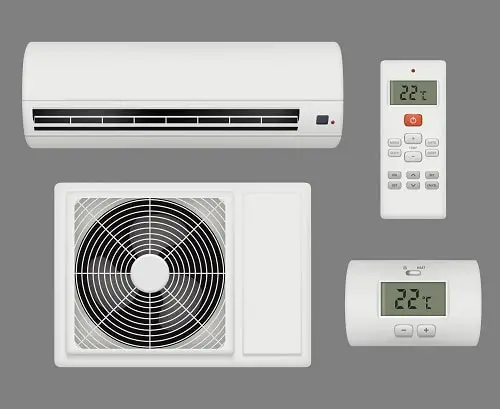
Pros
Fan
Easy to assemble
Can include misting
Low operating noise
Lower operating fees
Environmentally-friendly
Temporary cooling solution
Versatile and extremely portable
Air Conditioner
Massive cooling power
Designed for specific purposes
Ideal for massive spaces or multiple levels
Can include humidification, dehumidification, purification, and ventilation
Cons
Fan
Not ideal for massive spaces
Battles against high temperatures and humidity
Air Conditioner
High operating costs
Extensive installation procedures
Contains refrigerants with chemicals
Best For
Fan
Small areas and immediate spaces, ventilation and outside areas
Air Conditioner
Modern homes, multi-level buildings, extreme conditions
What is a Fan, and How Does it Work?
Fans are devices that produce airflow in a given environment. They have rotating components called blades or vanes, delivering ventilation in an open space.
The part that spins the blades is the motor or impeller. There may also be a housing unit, depending on the fan type that you purchase. It creates airflow with low pressure and high volume.
Fans are used as a means to circulate the air for improved climate control and thermal comfort. While some have buttons you can use to change speeds, you can also use a hand or wall control for remote functionality.
There’s a common misperception that fans ‘cool’ the air. However, it works by increasing the heat convection and promoting sweat evaporation, giving you the impression that the air is colder.
Fans can also serve other purposes not related to cooling. For instance, they can extract fumes, separate chaff off grains, eliminate dust, and help with drying wet areas.
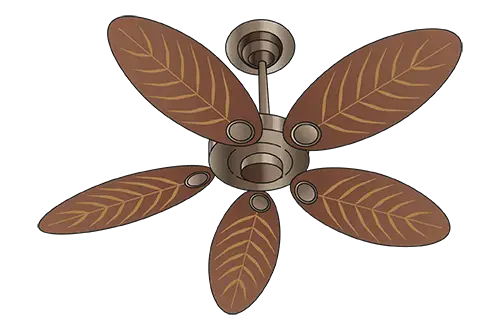
Types of Fans
There isn’t only one fan type available. While you’ll also find them in airplanes, we’ll predominantly focus on those used in homes and offices for climate control.
Tower Fans
Tower fans are tall and slim and generally oscillate vertically to provide better airflow while taking up less space. They may include additional features not available in other fans, such as purification and night light. Tower fans are also more silent than pedestal ones, delivering improved performance.
Ceiling Fans
Installing a ceiling fan in your home can eliminate wasting floor space. You can activate the various speeds with a pull chain or remote control. The one significant benefit is that it includes a light kit that can add to the room’s ambiance.
Floor Fans
Floor fans are extremely portable units that you can merely unplug, carry around, and plug back in. They’re limited in functions compared to tower and ceiling fans, but they offer a quick solution for ventilation and circulation. You can also use them as a secondary unit to assist other HVAC devices, such as dehumidifiers and purifiers.
Stands
If you add a long neck to a floor fan, you’ll get a stand fan. The extended pole ensures that you have improved circulation without having to place the device on a table. You can also angle the direction that it blows.
What is an Air Conditioner, and How Does it Work?
An air conditioner is an electronic device that helps cool the air through condensation and refrigerants. It draws in the warm air, lowers the temperature with internal components, and then returns the colder air to the room.
It also needs to expel the hot air. It usually does this through a duct or vent. The internal components generally consist of a compressor, evaporator, and condenser.
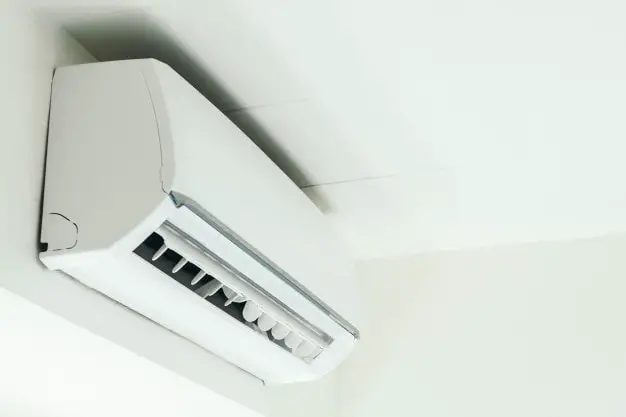
However, you can also find fans inside that deliver different speeds while circulating the air. There’s a cooling liquid that reaches the compressor in the form of low-pressure gas. The compressor pushes these molecules together, forcing the higher temperatures to rise.
When this gas hits the condenser, water vapor in the air turns into liquid. The evaporator ensures that this cold fluid returns to space in a vapor form.
Of course, the refrigerant helps to chill the air even more. The remaining hot air leaves through an exhaust hose to the outside, leaving your home or office cold.
Types of Air Conditioners
The industry is saturated with various forms of air conditioners, providing a phenomenal number of devices from which you can choose. While some of these have subtypes, such as portable evaporative air conditioners, we’re going to focus on some of the primary ones.
Single- and Double-hung Window
Window and mini air conditioners are ideal if you’re on a low budget and can’t afford to install an entire system throughout your home. They still deliver optimal performance, while you’ll receive window installation kits and brackets. What gives them an advantage is that the exhaust air goes immediately outside.
Portable
Portable air conditioners are convenient for moving around the house. It has wheels on the base with carrying handles on the side, providing cooling in the immediate vicinity. You don’t need to block your windows and that natural sunlight that you enjoy so much.
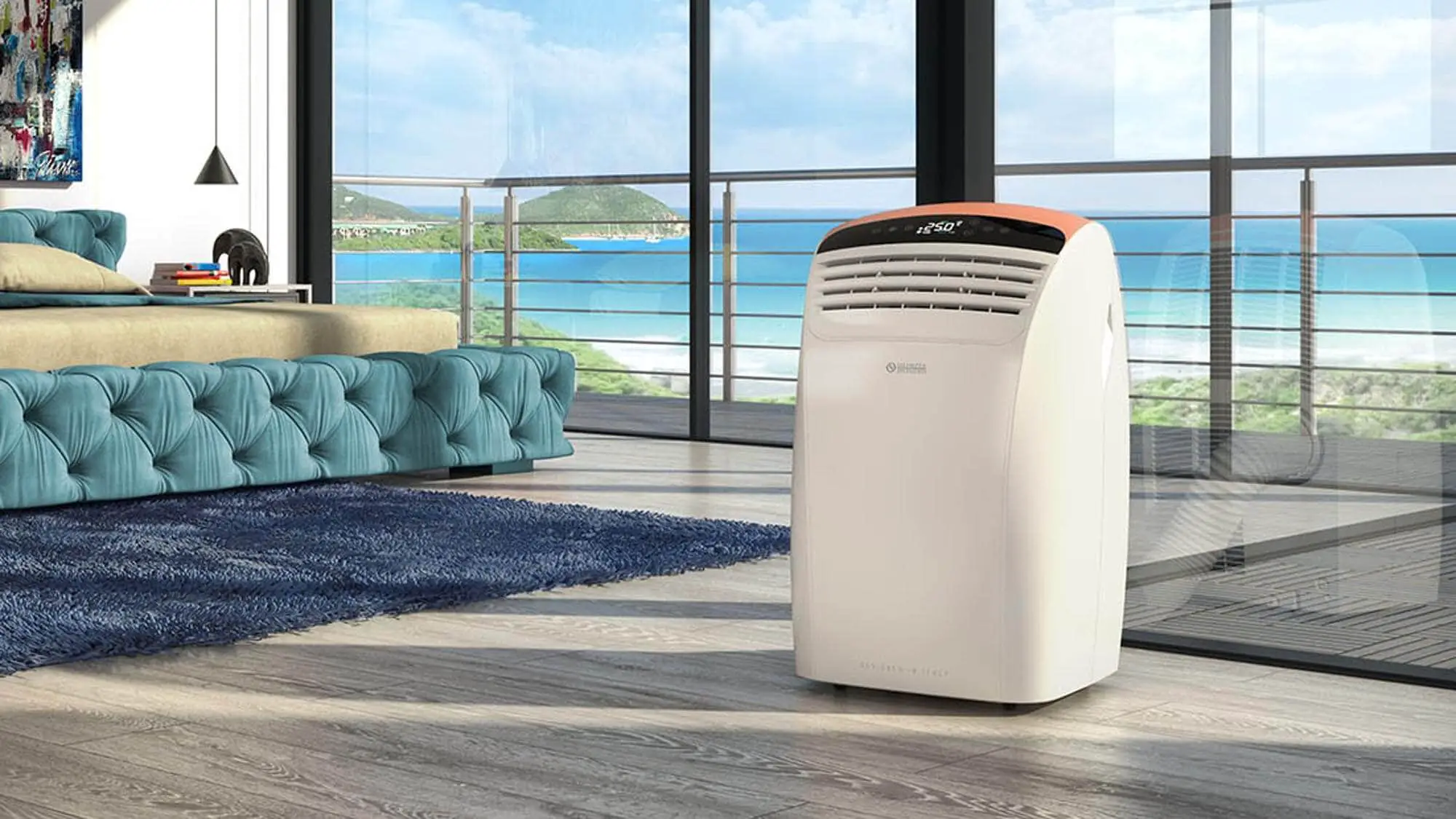
Ductless
Mini-split air conditioners are generally ductless, which helps if you only need them in one room. The most significant benefit is that there’s less power consumption as the device doesn’t need to pump the air through long ducts. You also won’t need to worry about any leaks.
Central
People with massive homes and warehouses prefer to install central or whole-house air conditioners. These devices have ducts and vents throughout the house into each room, ensuring that the chosen temperature is available in each space. Some even have zone control so you can change the settings per room.
Inverter
You usually need to change the temperature setting of an air conditioner if you feel it’s becoming too hot or cold in your room. Inverter ACs work differently, altering the fan speed to adjust to external factors that it detects through sensors.
Multi-Functional
Some manufacturers include other functions in an air conditioner so that you can have cold, clean air. For instance, you might find dehumidification, humidification, purification, and ventilation as part of the package.
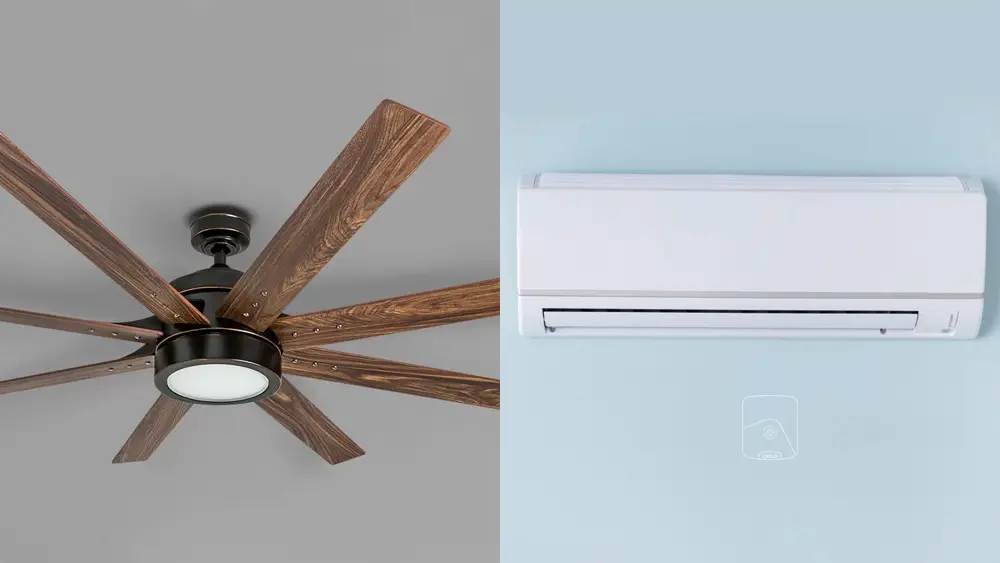
Relevant Characteristics Between a Fan and an Air Conditioner
Here’s a quick overview of the defined characteristics of fans and air conditioners.
Fan vs Air Conditioner
Compare by tapping or clicking below!

Cost
Fan
Low
Air Conditioner
High
Energy Efficiency
Fan
High
Air Conditioner
Low
Maintenance Requirement
Fan
Components
Air Conditioner
Components, filters, and refrigerants
Cooling Capacity
Fan
Medium
Measured in cubic feet per minute (CFM)
Air Conditioner
High
Measured in British Thermal Units (BTU)
Installation Requirement
Fan
Low to Medium
Air Conditioner
Medium to High
Portability
Fan
Installed: none
On stand: high
Air Conditioner
Installed: none
On wheels: high
Noise Rating
Fan
Low to Medium
Air Conditioner
Medium to High
Similarities and Differences
The table of characteristics provides a general overview of the similarities and differences between fans and air conditioners. However, we need to evaluate it a bit further to understand the scope of these variations, as there are hidden details that are harder to define.
Fan and Air Conditioner Differences
Let’s begin with defining the major differences for each of the variables we listed in the table.
Costs
In general, you’ll pay less for fans than air conditioners. Of course, it depends on the type you buy. For instance, a personal air conditioner that you can carry in one hand will be cheaper than an industrial ceiling fan.
Installation costs on air conditioners skyrocket above fans, as there are so many components and wires involved. This factor is especially true when you look at central AC units and the ducting involved.
Energy Efficiency
Fans are also more energy-efficient than air conditioners. The latter is well-known for consuming high amounts of electricity, even if you buy one with an Energy Star rating. The reason is that it takes so much power to convert warm to cold air, while fans simply help with ventilation by turning the blades.
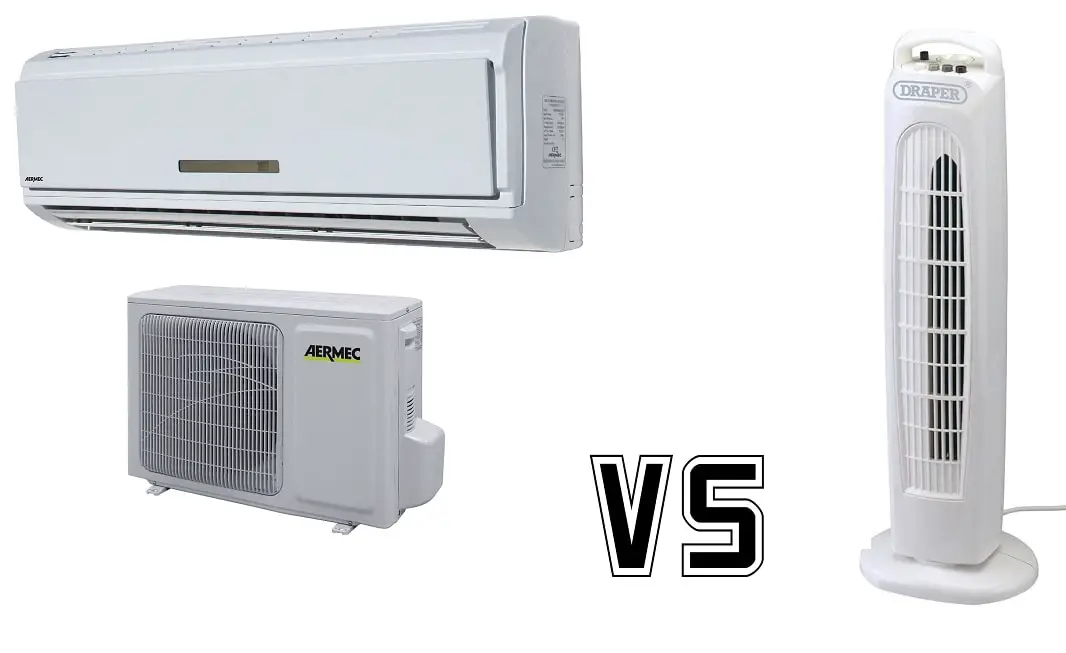
Maintenance Requirements
An air conditioner’s compressor, evaporator, and condenser run at different operating speeds and temperatures, causing wear and tear over time. Not only do you pay more for maintenance, but you need to service the motor more often. It’s also easier to clean ceiling fan blades than opening an AC unit to do the same.
Cooling Capacity
Cooling capacity is measured differently between fans and air conditioners, as the former only circulates the air rather than cooling it. Fans create better airflow that you measure in CFM, while air conditioners have BTU to reflect what room size it can cool.
Installation Requirement
Once again, this boils down to the type of fan or air conditioner. Ceiling fans and window AC units can both be challenging, but the way you install them differs. You might be able to install a fan yourself, but high-tech air conditioners may need a professional installer.
Portability
While both fans and air conditioners have portable options, the method in which you transport them differs. Fans have stands that you can place on the floor with a simple lift-and-carry method. AC devices have wheels at the base with carrying handles on the side so that you can roll them from one room to another.
Noise Rating
Fans are generally more silent than air conditioners, as the latter requires more power to transfer hot air to cold. The motors are excessively loud, while most fans have silent performance. Of course, you do find powerful ceiling and central fans that can produce just as much noise.
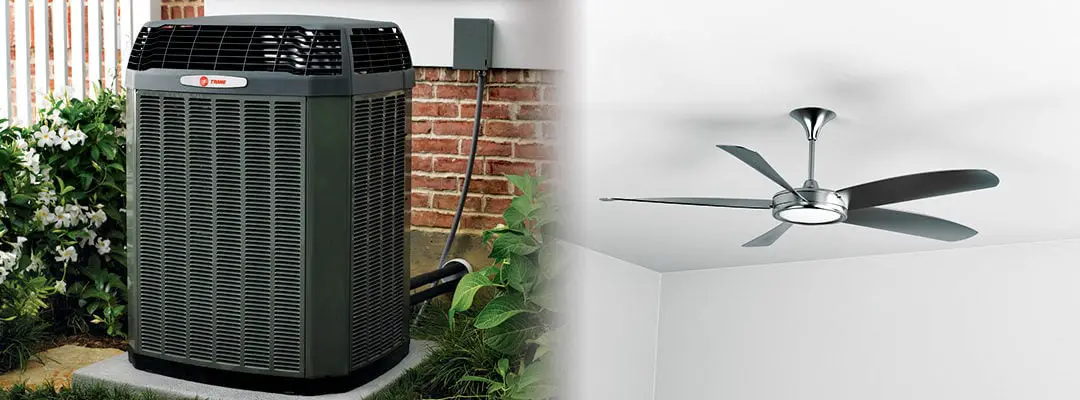
Fan and Air Conditioner Similarities
Now that we’ve investigated the differences between each variable, we’ll discuss some similarities we’ve identified.
Costs
There are two cost factors that are consistent between the two categories. The first is the same list of elements you need to budget for, namely purchase, installation, maintenance, and replacement parts.
Secondly, you can generally define a price range based on the brand or features you receive. Low-range items have the most basic functions, mid-range products have improved power and performance, while top-range devices deliver the ultimate cooling experience and functionality.
Energy Efficiency
Another common factor is that fans and air conditioners receive Energy Efficient ratings for power consumption. Manufacturers work hard to ensure that you don’t spend too much electricity on a monthly basis, and you can buy portable and personal AC units that use the same power as some fans.
Maintenance Requirements
It doesn’t matter whether you own a fan or air conditioner. Both have components that you’ll need to service, such as the motor that both of them have. If you don’t maintain it correctly, you’ll reduce the device’s lifespan.
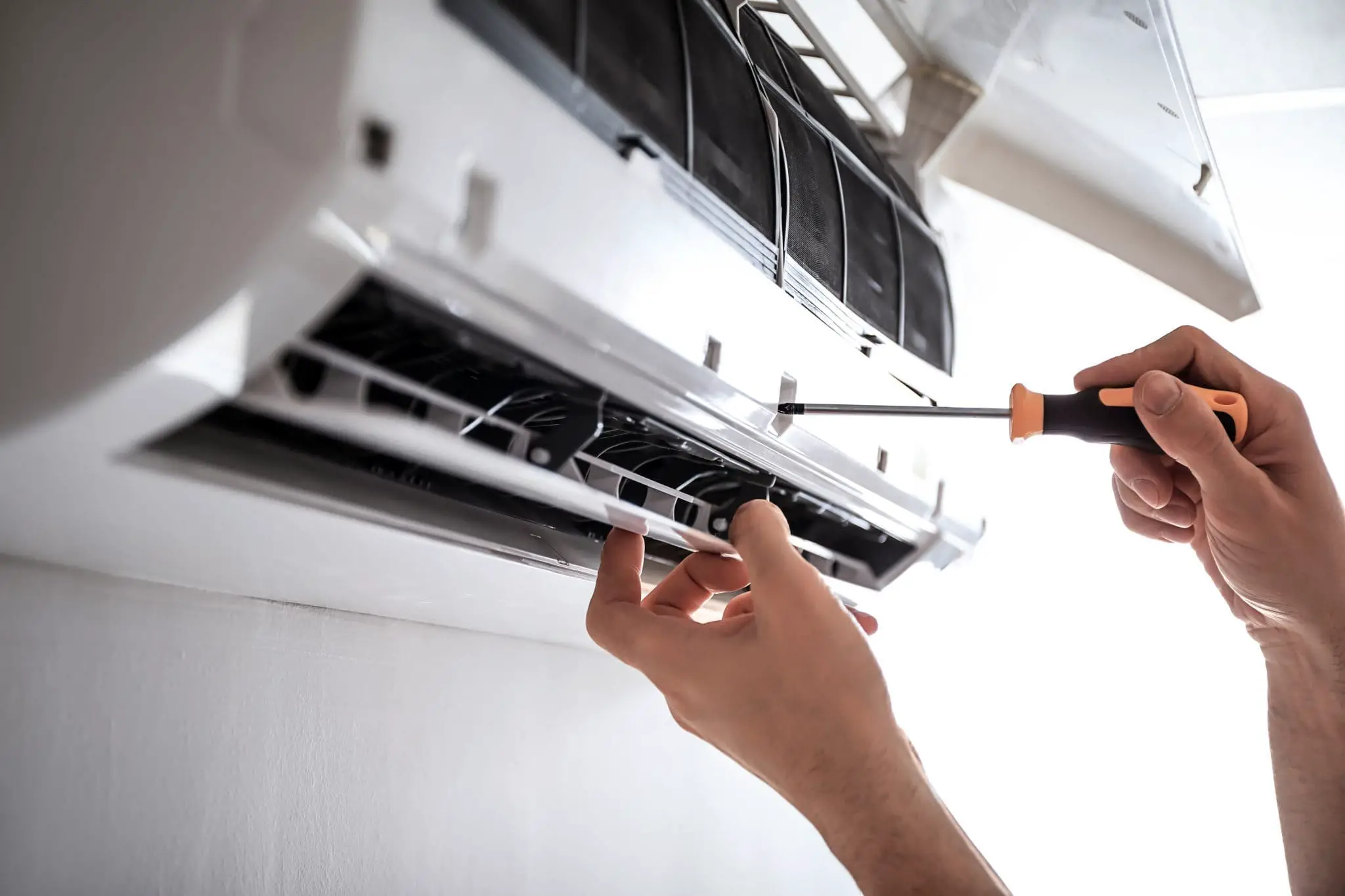
Cooling Capacity
Despite having different measuring units for cooling capacity, they both relate to how much space they cover in square feet. You can generally use it as a basis for seeing whether the device is large enough to cover your room, or if you should aim for a more powerful air conditioner or fan.
Installation Requirement
Some air conditioners or fans are plug-and-play devices that require no installation at all, while you’ll need to spend a few hours on others to get them in place. The installation components differ, but the time and effort remain the same. In some cases, you may need to hire a professional to cover the wiring or lighting.
Portability
Both fans and air conditioners have portable models that you can move around the house or take on trips with you. Some products you can also install in your motorhome and then remove when you return.
Noise Rating
The common factor between both is that you can measure the noise levels in decibels (dB). Furthermore, manufacturers sometimes include parts to help dampen the noise levels.
Advantages of Using a Fan
Fans have specific benefits in certain situations. While some air conditioners can do the same, we’ll look at the overall advantages of using fans.
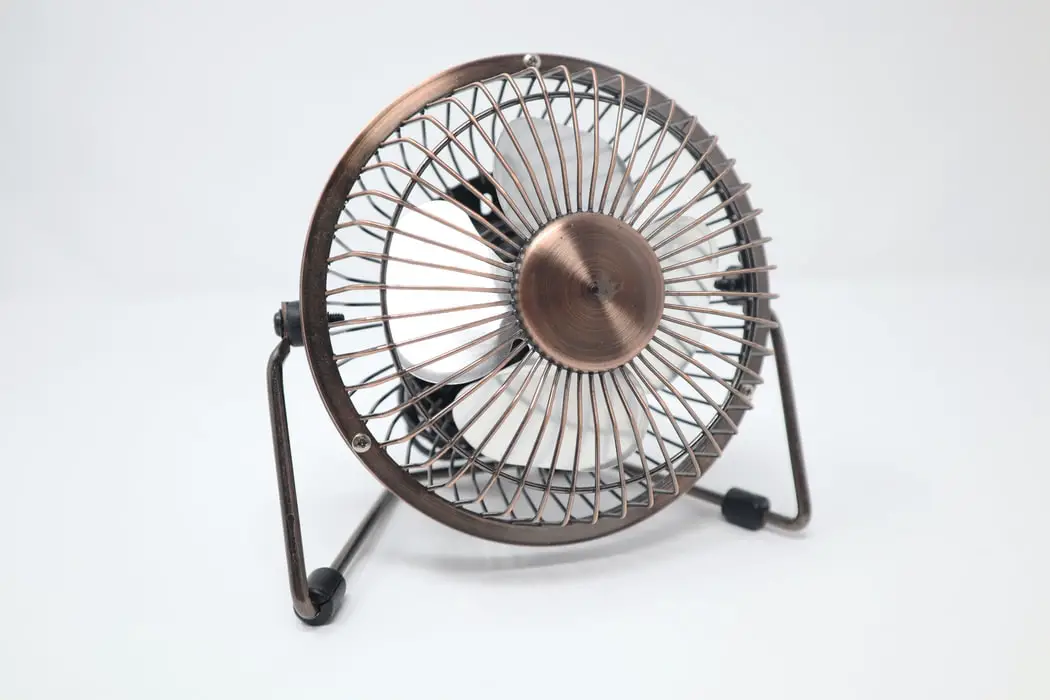
Lower Operating Fees
It’s easy to see why fans are more affordable to buy, operate, and maintain. There are fewer components involved, and you won’t have to repair or service them as often. Furthermore, installation is fairly easy when compared to air conditioners, so you won’t need to spend time or money putting it in place.
Versatility and Portability
Fans are easier to transport than air conditioners, making them more versatile in nature. You can also use them in several locations, such as your house, the basement, the office, your porch, and motorhomes. They’re also quicker to pack up and store.
Environmentally-Friendly
Some air conditioners use and emit chemicals during the cooling process, which can be harmful to the environment. For this reason, many people buy fans to prevent damage to their lungs or the ecosystem. Most fans also consume less power, so they have less of a carbon footprint.
Temporary Cooling Solution
If you only want a temporary cooling system, fans are the preferred option. You can hook one up on your desk and feel the relief immediately. Once your task is done, you can pack it up and take it home with you or switch it off after the meeting.
Easy to Assemble
Air conditioners contain several parts you need to take apart to clean or put together during installation. Fans hardly need assembly, unless you’re aiming for ceiling fans. You can simply plug it into a socket and instantly receive the cooling effect.
Misting Action
The one significant advantage that fans have over air conditioners is the ability to provide a misting effect. Sometimes a wonderful, cool spray is all you need to combat that summer heat.
When to Use a Fan
You’ll want to use a fan when you need air circulation and ventilation. Low costs, easy transport, and assembly, and temporary cooling is the name of the game. It also helps if you’re looking to save electrical costs and the environment through friendlier cooling methods.
Advantages of Using an Air Conditioner
Air conditioners also have several benefits, which you’ll need to weigh against the costs and overall investment. Let’s take a look at when you would want to buy one.
Massive Cooling Power
Air conditioners provide much more cooling power than fans, delivering airflow and colder air to extensive spaces. Instead of buying several fans, you may want to opt for one large AC device. Furthermore, it helps when the temperature shoots so high that only an AC can assist.
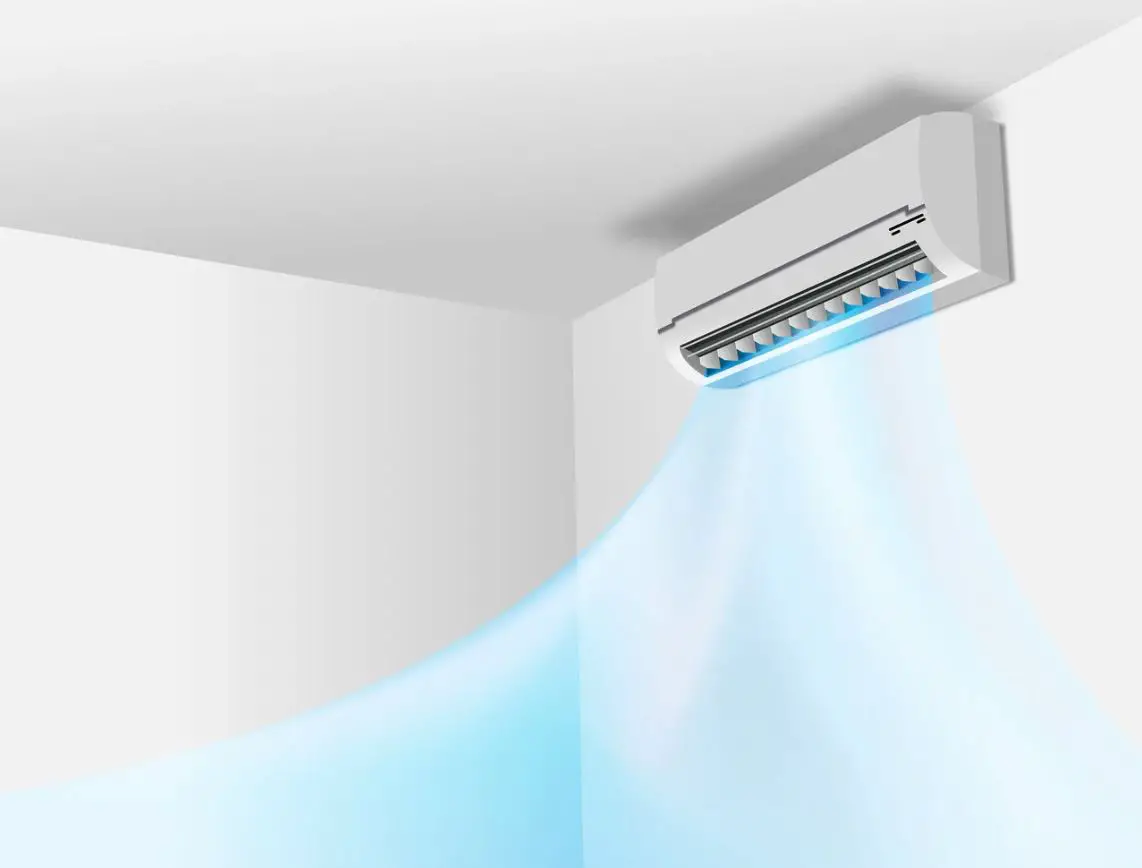
Specific Purpose
There are air conditioners designed for specific purposes that fans can’t match. You may want to remove the hot air completely instead of simply circulating it around the living area. It also helps to add moisture to the air if you live in a dry climate.
Additional Functions
Air conditioners might have extra features that a fan can’t replicate. For instance, there might be internal filters to assist with purification, removing allergens and dust. You might even find a humidification setting if you’re dealing with dry air.
Modern Homes

Many modern homes have designs and layouts better suited for air conditioners. Architects love placing large windows for a stunning view, letting in more heat than is necessary and creating a greenhouse effect. There’s also more space in the homes of today, which fans will struggle to cool.
Ventilation and Cooling
Why settle only for cooling when you can have ventilation, too? Some air conditioners have internal fans that you can turn on that provide the same function as standard fans. You’ll have the best of both worlds.
Multiple Levels
If you’re dealing with a home or workplace that has multiple floors, a fan just won’t cut it. It doesn’t have the superior performance of an air conditioner to deal with multiple levels, which is one of its greatest benefits.
When to Use an Air Conditioner
You’ll want to grab one of these devices when you have a massive area to cool, especially where multiple floors are involved.
If you would like the option of cooling and ventilation, an AC unit can do both. It’s also best suited to modern homes with large windows and living spaces.
What About Evaporative Coolers?
Unlike air conditioners, evaporative coolers use cold liquids stored within the device to cool the passing air and then evaporate it back into the room. You’ll generally refill the tank with cold water or ice to keep the process going, but there are several benefits to using this over standard AC units.
Energy Efficiency
Since you won’t be using the same high-tech components of a standard air conditioner, the evaporative or swamp cooler only concentrates on raising the cold vapor into the air. As such, you can save up to 80% on electrical costs alone. It’s also a great way of increasing humidity naturally in dry climates.
Internal Ventilation
The evaporative system is at its best when it draws in the outside air to cool for the internal space. In this way, it doesn’t reuse stale air but introduces fresh ventilation. Some devices also have a UV filter to stop bacteria and pollen from causing issues with your breathing.
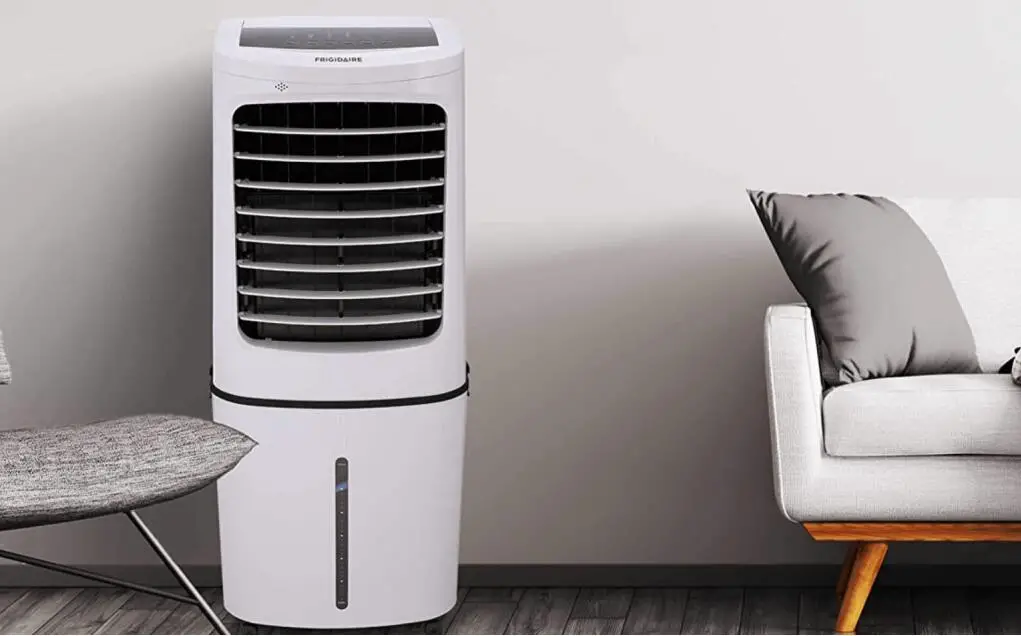
Operating Costs
The initial purchase cost of a swamp cooler is lower than an air conditioner, as there are fewer components involved. It won’t be more affordable than some fans, but it provides the ideal balance between them. You’re using nature’s natural cycle of evaporating cold water into your home, which is why you’ll pay less.
Environmentally-Friendly
We’ve already mentioned that air conditioners sometimes emit chemicals during the condensation phase or use of refrigerants. Since you’re using natural water, it eliminates any harmful gases from being introduced into the air. The lower power consumption also means less of a carbon footprint like the fans.
Maintenance Requirements
With fewer components and water in play instead of refrigerants, you’ll have less maintenance to deal with. Sure, you still need to budget for servicing the motor or replacing parts, but there will be fewer expenses involved. Simply top up with water and ice that’s free of charge, and you’re good to go.
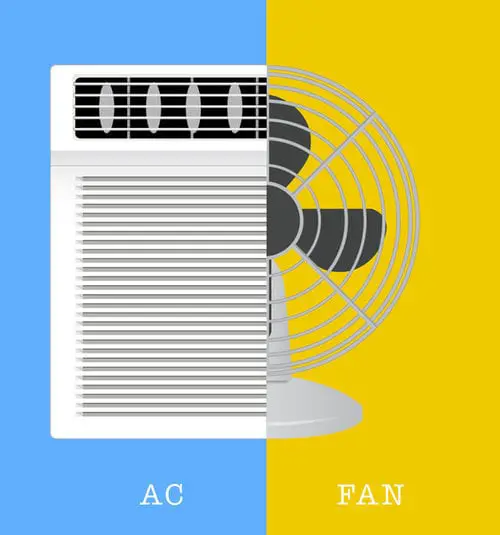
Bottom Line
It can be challenging to decide whether you should aim for a fan or air conditioner, but we hope this guide has provided some assistance. For the most part, fans are useful if you need to cool a room or immediate space for a limited time period, or if you’re aiming toward lower operating costs and improved airflow.
However, fans will struggle against high temperatures and humidity, while they are useless in cold climates. Furthermore, they can’t aid you in cooling massive spaces or your entire home. If you have a multi-story building, you’ll save costs and installation by installing an air conditioner instead.
People Also Ask
Before we leave you to your thoughts, we may have some answers to any lingering questions in your mind. Here are a few FAQs that may provide a solution to your problem. If you have any other queries, please let us know.
A fan is by far the healthier option, as all it involves is spinning blades that help evaporate the sweat from your body and drive out the heat or steam. Air conditioners use refrigerants that contain chemicals that may be harmful to your health, especially if you have breathing or lung issues.
Prolonged exposure to air conditioners dries out nasal passages, causing irritation to the mucus membranes in your nose.
Mucus protects you from viral infections, while you may also end up dehydrated. It may lead to migraines or headaches.
An air conditioner uses much more electricity than a fan, even if you have one with an Energy Star rating. It uses more power for the components to cool the air, while fans merely rotate the blades.
Running a fan all night is not expensive, and you can freely do so without worrying about incurring high utility costs. Many people prefer to do so for a sound night’s sleep and so that the fan doesn’t take long to cool the room the next day.
